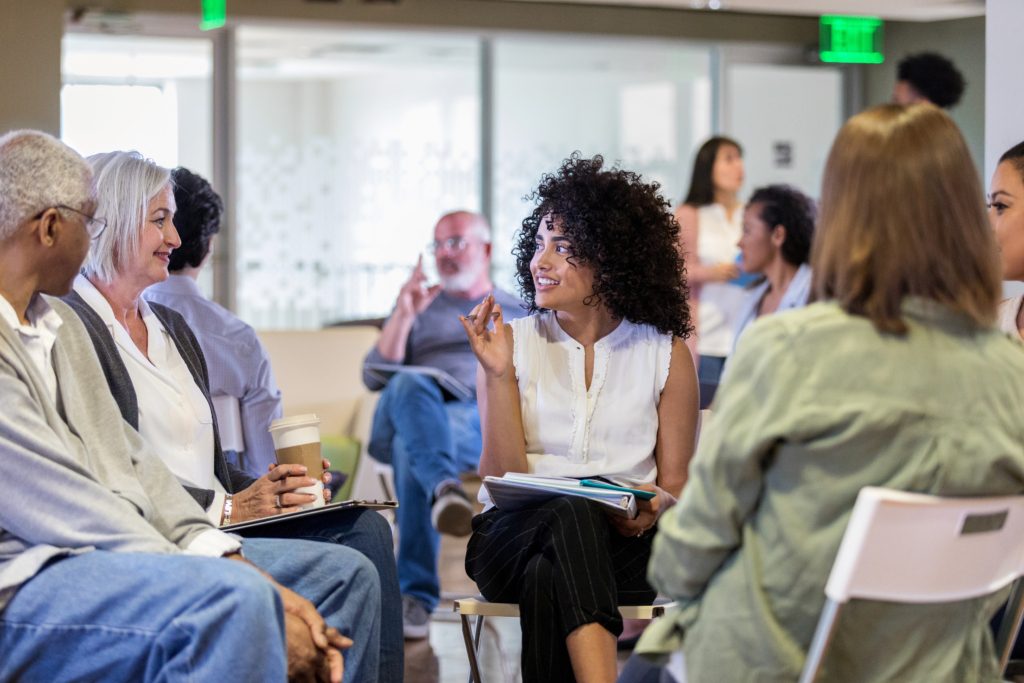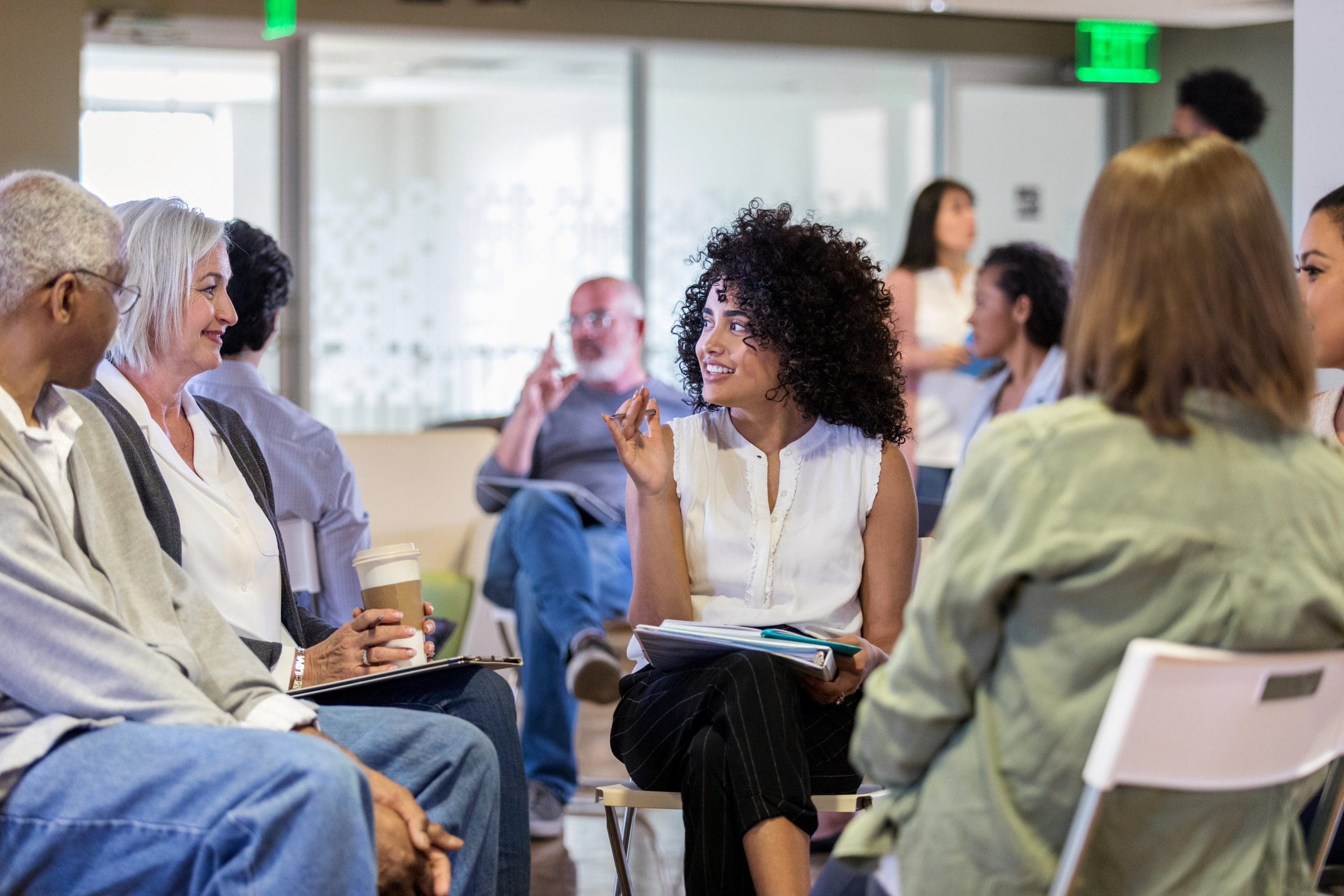
Grantee learning cohorts have gained popularity in the philanthropic field, as a way for foundations to go beyond individual grantmaking to broader learning, reflection, and collaboration with their grantees. As we were debriefing a two-year project in which FSG supported a cohort of Missouri Foundation for Health grantees, they asked—how might the foundation better engage a cohort of grantees in service of systems change?
Over the years, we’ve facilitated numerous grantee cohorts, each with a slightly different purpose, for groups focused on a variety of different systems. We’ve observed that funders gather grantees for lots of reasons and often couch this under the banner of “learning.” This can be confusing, as there are various ways of thinking about “learning,” such as:
- To “learn,” in an academic sense of the word, e.g., learning something new or being exposed to new content
- To reflect, on action, in action, or for action; often this reflection had been at the organizational level by creating space for cohort members to reflect on their own work
- To move together, toward a common goal; funders were often hoping that grantees would coalesce around a particular outcome, or brainstorm mutually reinforcing activities
- To build relationships, to celebrate and mourn, to build a sense of collective, or to make sense of the karass you find yourself in, by virtue of the work you do
- To gather information or intel on the system (often for funders’ benefit), to increase understanding of systems’ momentum, challenges, and outputs
It’s worth stating the obvious: the outcomes you can expect from a cohort experience really depend on the intentionality with which you set it up. While any of these purposes could be helpful in supporting systems change, we realized we could bring even more intention to planning, by understanding and agreeing on an overarching strategy or theory of change about how the group could effect systems change.
For example, the group might seek to better understand the system—the key stakeholders and organizations, interactions and interrelationships, formal and informal rules, and what the system is producing. In that case, cohort activities need to draw participants out of their day-to-day work within their organization and in their community and pull up to look at the system from a different vantage point. This could be done through a systems mapping process, reviewing a landscape assessment, or reviewing state-wide or national data.
Cohort activities could also help the group understand system dynamics—the flows, blockages, and momentum in the system. The group could expand the system map they’ve created to identify areas of opportunity or challenge and discuss among the group why these challenges exist. The Water of Systems Change paper is quite helpful in thinking through the various challenges holding problems in place. Another helpful activity is to hear directly from people who are experiencing negative outcomes, or for whom the system isn’t really working. Their voices are vital to include, to help the group to have a fuller perspective and understanding of the system. These voices may come from within the cohort, or by inviting folks from outside the cohort to join. In both situations, care must be taken to avoid extractive experiences for participants.
Helping cohorts to decide how to intervene in the system often goes down one of two paths. The first is anchored in how each participant or their organization uniquely contributes to systems change. Many of the cohort participants we’ve worked with have shared the importance of having dedicated planning time with their team to plan and discuss their own activities. Funders could support this with on-site or ad hoc strategy support from systems stakeholders, foundation staff, or consultants. The second path involves intentionally planning coordinated activities among the cohort group. For some groups, this might mean co-creating an advocacy agenda. For others, it might be better aligning or integrating services. The difference between the two is that, in the second path, the emphasis is on cohort members acting together.
Finally, a key aspect of any systems change strategy is attending to feedback loops. Designed with intention, most cohort activities could meet this purpose. For example, most cohorts start with a connector activity, so you could ask people to share an example of a recent success they’d had and begin to trace the ripple effects in the system (anchoring in your systems map and using Ripple Effects Mapping could helpful). Other groups have engaged evaluation partners (e.g., using a developmental evaluation approach) to share data and information about the system, and the group engages in sensemaking conversations about the data.
In sorting this through, we surfaced a few takeaways for our own practice:
- Cohorts solely focused on “learning” can only take you so far in the systems change process
- Reflections will depend on who you have in the room—e.g., reflections from practitioners or front-line staff will be different than mid-level managers or organizational leadership, because their roles and decisions are very different; reflections could be more or less supportive depending on who’s in the room, and how the gathering is facilitated
- If you want a cohort to intervene in a coordinated way, that focus needs to be made explicit, or else folks will continue to intervene in a way that makes the most sense for their organization
- Building relationships has many benefits to the individuals participating and can build networks; if you want those networks to have ripple effects in the system, that purpose needs to be made clear (e.g., through a shared agenda)
- Gathering intel shouldn’t be self-serving for a funder; if done well, it could provide space for a coalition to come together, reflect, and plan coordinated interventions
Grantee learning cohorts are a great way to engage people who are working to advance the same goals. We’d love to hear about how you’ve experienced grantee learning cohorts. Please reach out using the brief form below if you’re interested in discussing it with us.

